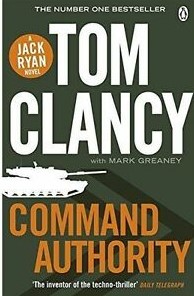
Russia is about to invade Ukraine. Or so the warnings from the UK, the United States, and various other western governments have been telling us for the past couple of months.
Whilst normal practice would be for analogous war fiction to appear after the event, Russia in Fiction has a fascination with those authors who wrote Russian history before it happened. (See our reviews of, for example, The Fall of the Russian Empire and The Red Fox).
Tom Clancy and Mark Greaney wrote about a Russian invasion of Ukraine back in 2013, before even Crimea had been incorporated into the Russian Federation. Command Authority spotted that possibility in advance. But now, in 2022, the novel’s plot seems potentially prescient once more.
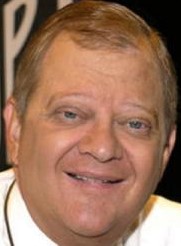
You’ve got to hand it to Thomas Leo Clancy Jr, he was the king of his genre; by which we don’t mean spy novels per se, but rather vast, sweeping, geopolitical thrillers, or —as the phrase emblazoned across the front of the UK published version of Command Authority has it— ‘the techno-thriller’.
Command Authority was his last book, published shortly before his death in 2013 and co-written with Mark Greaney. As so often before, Clancy nails his subject. With Greaney’s assistance, he went out on a high of prescient insight, combined with fast-moving action, complex plotting, and a group of characters with whom his readers have gone through the decades.
Command Authority is a 700+ page thriller that has dual plot lines, 30 years apart, following Clancy’s long-standing lead character, Jack Ryan —former CIA analyst, now US President— and his son Jack Jr, who works for that organisation much loved by thriller writers, an off-the-books security agency.
Let’s be specific about Clancy’s prescient nailing. Published in 2013, the year before Russia took Crimea from Ukraine and re-incorporated it into Russia with ease, and without facing military force in opposition, this is precisely what happens in Command Authority.
Just as in the real world, the western powers realised that there was little they could do —perhaps little they wanted to do— about Russia’s seizure of Crimea, and so they put their efforts into making Russia stop there and not proceed to occupying the rest of Ukraine and other former Soviet states.
As US President Jack Ryan says to Russia’s President Volodin
‘Your armor stops where it is, and returns to the Crimea. You will have won a small victory.’
Command Authority, p. 730
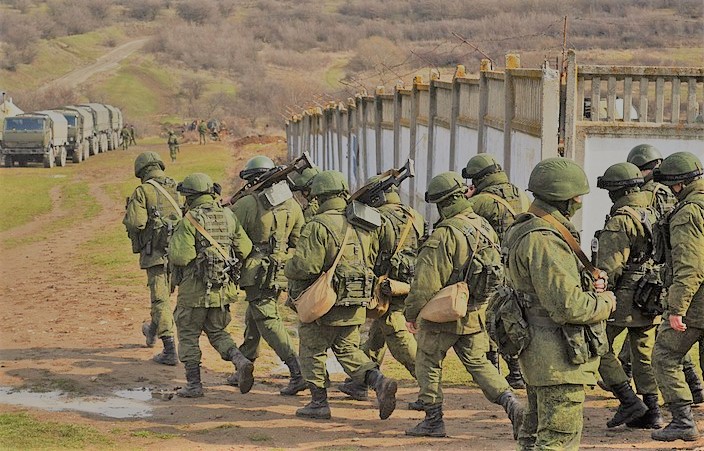
The basic plot of Command Authority involves an expansionist Russia, ruled by a corrupt group of siloviki (former and current Russian security service officers) in cahoots with the Russian mafia. So far, so relatively common for Russia in fiction. The particular plot nuance of Command Authority is that it is set in the present (or should that be the ‘near future’ so beloved of thriller writers) and also 30 years ago as the Soviet Union approached collapse.
In 1984-85 a senior KGB man recruits a reliable young army officer cum assassin to work in secret to salvage something for the future out of the wreckage that the Soviet Union is becoming. A group in the KGB know that General Secretary Chernenko is dying, are sure that Mikhail Gorbachev will become Soviet leader, and are
“worried about the future, worried about where Gorbachev will take the Union. Worried about where Reagan is taking the West. Worried everything might come crashing down on top of us … I work for a group of survivors. Men in the KGB and the GRU, men who know that the continued existence of our organizations is the survival of the nation, the survival of the people. The Kremlin does not run this nation. A certain building in Dzerzhinsky Square runs this nation”
“The KGB building?”
“Da. And I have been tasked with protecting this building, not the Communist Party”
…
“The USSR is a large boat, you and I are two of the passengers … now I have been asked to tend to the lifeboat, a great responsibility entrusted to me by the officers” …
“The lifeboat. What is it?” …
“It’s money. It’s just f***ing money”
Command Authority, pp. 4-7
It is a neat set up. The idea being that as the Soviet Union collapsed, a few astute KGB officers established a series of secret accounts around the world, with the help of the mafia, and used them to fund a takeover of the new Russia which emerged out of the Soviet collapse.
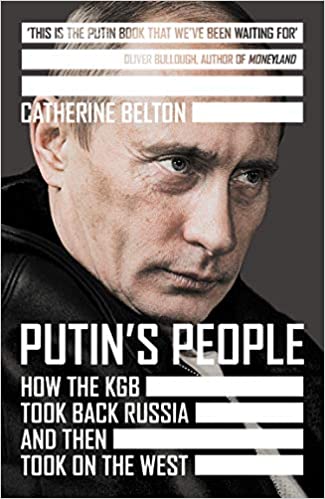
It is a notion that bears strong resemblance to that detailed in Catherine Belton’s non-fiction book Putin’s People: How the KGB took back Russia and then took on the West (2020).
The KGB officer in the early exchanges from Command Authority quoted above, setting up the operation, becomes Russian President, Valeri Volodin. He is a type of Putin figure, but he is of course a fictional character and not an exact match, not the least because Volodin is in his first term as president at the time Command Authority is set.
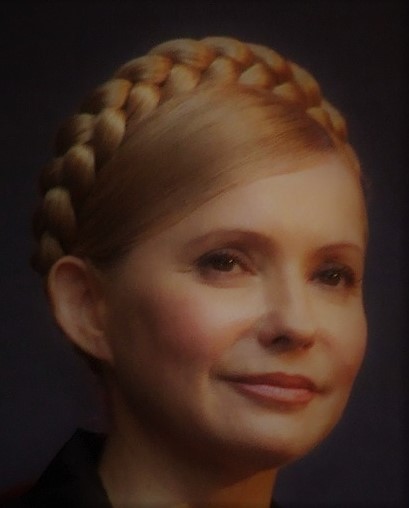
Clancy likes to have characters who reflect real life figures, so, for example, Command Authority features a female Ukrainian politician who braids her blonde hair in the traditional style, just as former Ukrainian Prime Minister Yulia Tymoshenko does
Once these ex-KGB men have retaken power in Russia, they set about trying to regain former Soviet territory, starting with a brief foray into Estonia, but then turning to Ukraine.
Clancy and Greaney have a disillusioned Russian security official asserting something that has, in its first sentence at least, become a very familiar phrase in the UK and the US media in the first month or so of 2022
“Russia will invade Ukraine, probably within the next few weeks. They will annex the Crimea. From there, if they meet no resistance from the West, they will take more of the country, all the way to the Dnieper River. Once this is achieved, I believe Volodin will set his eyes on making beneficial alliances from a position of power, both in the other border countries and in the former nations of the Warsaw Pact.”
Command Authority, p. 57
The assertion is also made that when this happens, ‘getting Europe on board to fight for the Crimea is a nonstarter’ (p. 70). That was certainly the case in relation to Crimea in 2014.
Command Authority features a number of the standard elements of contemporary thrillers about Russia. Someone is murdered by polonium-210 poisoning, and the turning off of the gas pipelines from Russia to Ukraine as a political weapon is brought into the plot.
Great play is made too of that fabled staple, the code of honour of the vory v zakone (‘thieves in the law’) who combine vicious criminal activity with a strict ethic of behaviour and brotherhood within a strongly exclusive cadre. (See, le Carré’s Our Kind of Traitor, Mark Burnell’s character Kostya Komarov, Christopher Reich’s The First Billion, Tom Rob Smith’s The Secret Speech, the movie Eastern Promises, and many other examples).
Clancy went out on a high with Command Authority. It is the usual giant of a book, 700+ pages, replete with military-technical jargon, gung-ho heroes, and the rest. At the risk of sounding tautological, if you like Clancy, you’ll love Command Authority. And Russia in Fiction does —despite it being rather uncool— have a fondness for Clancy novels about Russia (see our review of The Cardinal of the Kremlin).
This fondness all stems back to the time when I lived in a wonderful apartment right on Tverskaya Street, 10 minutes from the Kremlin, in the early 1990s. Clancy’s early novels served very well there —partly because they were huge tomes which would last a good few days, partly because they were about the Soviet Union and it was a pleasure to break off from reading for a brisk stroll down to Red Square and back, earthing Clancy’s overblown but feasible fantasies on the streets around the Kremlin.
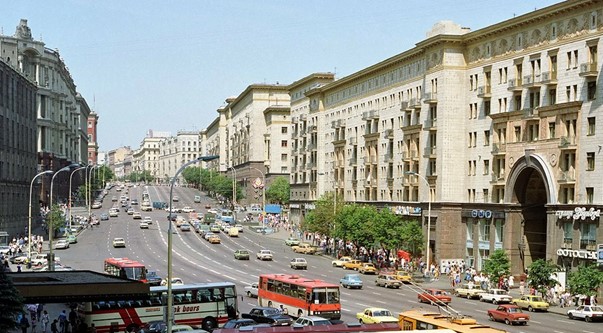
But back to today. Clancy and Greaney’s prescience is all very well, and Russia in Fiction has noted it —both on this blog and in the book Inside Russian Politics (2017)— when it comes to the annexation of Crimea. But we would very much prefer it not to be prescient again in 2022.
Command Authority ends with a conversation between the US President, Jack Ryan, and his son.
Jack Junior wasn’t patting his own back, though. “I don’t know, Dad. Volodin is still alive and in power. They are dancing in the streets in the parts of Ukraine where he is now the head honcho. Doesn’t feel quite like a victory”.
Ryan said, “It’s not the ending any of us wanted. But we stopped a war.”
“Are you sure you didn’t just delay it?”
Jack Senior sighed. “No. I’m not sure at all.”
Command Authority